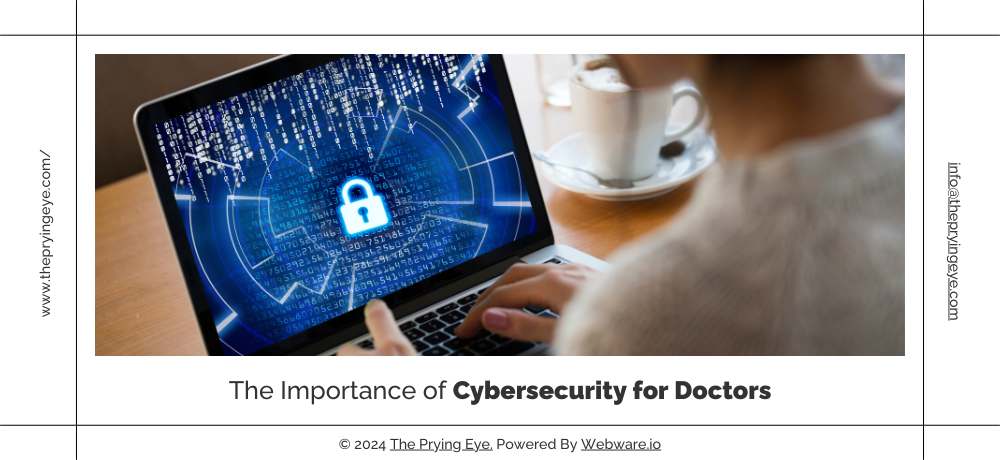
The Importance of Cybersecurity for Doctors
- The Prying Eye
Welcome to a critical discussion tailored for the medical profession, where the stakes of digital security are as high as the health risks you manage daily. In an era where technology profoundly integrates into all aspects of healthcare, understanding and implementing robust cybersecurity measures is not just advisable; it's imperative. This blog explores why cybersecurity is essential for doctors and how failing to prioritize it can lead to dire consequences, not just for your practice but for the privacy and safety of your patients.
1. Why Cybersecurity Matters in Healthcare
The healthcare sector has become one of the most targeted industries by cybercriminals. The reason is straightforward: healthcare records contain comprehensive personal information that, when stolen, can be exploited for identity theft, fraud, and even blackmail. For doctors, protecting this data is not just a matter of ethical responsibility but a legal obligation under laws like HIPAA in the United States and PIPEDA in Canada.
Moreover, the integration of digital technologies in healthcare, from electronic health records (EHRs) to IoT-enabled medical devices, increases the potential attack surfaces for cybercriminals. Each point of digital contact represents a potential entry for breaches, making an effective cybersecurity strategy essential.
2. Common Cyber Threats Faced by Medical Professionals
Ransomware Attacks
Ransomware has become infamous in the medical sector, locking healthcare providers out of their systems and demanding hefty ransoms to restore access. These attacks not only cripple your ability to work but also put patient lives at risk, particularly when critical data and systems are inaccessible.
Data Breaches
Whether due to malicious attacks or accidental leaks, data breaches can have devastating effects. They erode patient trust and can lead to significant financial losses through fines and legal fees. Ensuring that patient data is securely encrypted and access controlled is crucial.
Phishing Scams
Phishing remains a significant threat, with attackers often impersonating tech support or other trusted figures to extract sensitive information from unsuspecting staff. Regular training and awareness can help mitigate this risk.
3. Best Practices for Enhancing Cybersecurity in Your Practice
Adopting a proactive approach to cybersecurity involves several best practices that can significantly reduce your vulnerability to cyber threats:
Regular Risk Assessments: It is crucial to continuously monitor and evaluate your company's cybersecurity practices to identify potential vulnerabilities. This proactive approach involves conducting thorough assessments at regular intervals to ensure that all aspects of your cybersecurity are up-to-date and effective against emerging threats. These assessments help in making informed decisions about where to allocate resources and how to strengthen defenses.
Employee Training: Human error remains one of the largest security vulnerabilities in any organization. Providing employees with regular training sessions on how to recognize and respond to cyber threats is fundamental. This includes educating them about phishing scams, proper password practices, and the importance of reporting suspicious activities. Such training ensures that your team is not only aware but also prepared to act as the first line of defense against cyber attacks.
Advanced Security Solutions: To protect against sophisticated cyber threats, it is imperative to implement cutting-edge security technologies. This includes setting up robust firewalls, deploying anti-virus software, and utilizing intrusion detection systems that actively monitor and prevent unauthorized access to your network. These tools provide a necessary layer of defense that helps safeguard your digital assets from malicious attacks.
Data Encryption: Encrypting sensitive data is a critical security measure that ensures your information remains secure, whether it is stored on your systems or transmitted over the internet. Encryption converts data into a coded form that can only be accessed or decrypted with the correct encryption key. This practice protects your data from unauthorized access and breaches, providing peace of mind that your confidential information is secure.
Access Controls: Implementing strict access controls is essential for maintaining the integrity and confidentiality of sensitive information. Access to critical data should be restricted to individuals who require it to perform their job responsibilities. By employing role-based access controls, you can ensure that the right people have the right access at the right times, minimizing the risk of internal and external data breaches.
While the upfront cost and effort of implementing these measures might seem daunting, the long-term benefits of securing your practice’s digital assets are invaluable.
4. Partner with Cybersecurity Experts
Given the complexity and ever-evolving nature of cyber threats, partnering with cybersecurity experts provides peace of mind and allows you to focus more on your primary duty—caring for patients. Our team of certified cybersecurity professionals specializes in protecting small to medium-sized businesses, particularly in high-stakes fields like healthcare.
5. Why Choose The Prying Eye?
At The Prying Eye, we understand the unique challenges and requirements of the healthcare industry. Our tailored cybersecurity solutions ensure that your practice is not only compliant with the latest regulations but also fortified against the most sophisticated cyber threats.
In conclusion, as a doctor, the responsibility of protecting patient data and ensuring the continuity of your services is paramount. In the digital age, this means prioritizing cybersecurity. With The Prying Eye, secure your practice’s future and maintain the trust that your patients place in you. Don’t wait for a breach before you act. Contact us today to learn how we can help you build a resilient cybersecurity posture that defends and empowers your practice.
